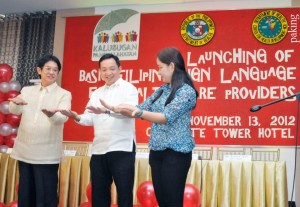Department of Health Center for Health Development – National Capital Region (DOH CHD-NCR) Director Eduardo C. Janairo today launched the first Filipino Sign Language (FSL) Module that will be used by health workers in understanding and communicating with patients with hearing disabilities.
“This FSL module will be used to facilitate proper communication and provide understanding of patients with hearing impairments. Health workers will be educated and trained on the proper gestures and body movements illustrated in the module for them to be able to communicate properly with people who uses sign language,” Director Janairo explained.
“We need to introduce FSL in our health care system and strengthen its use for the benefit of people who have difficulty hearing or speaking. Health workers will also benefit from using this module as it will enrich their knowledge, skills and awareness on the needs of people using FSL as their communication,” Janairo further stated.
According to the 2000 Census on Person with Disabilities (PWD), there are a total of 120,000 deaf populations in the country. The 2004 Philippine Registry on Persons with Disability showed a total of 571 registered PWDs at the National Capital Region with speech and hearing impairment.
According to Janairo, the module introduces the health worker to the basic signs that they will need to communicate with deaf patients. From the alphabet, numbers, greetings, time, days, months and common questions asked in the emergency room, and using simple gestures, it will provide them with simple interaction with hearing impaired patients.
It is very important for health workers to be educated with the basics of FSL to be able to convey their messages and instructions on the services they are rendering to their deaf patient and also to understand the patient when he/she discloses information about his/her illness and providing the appropriate treatment acceptable to the deaf patient. This will prevent inaccuracy and errors in communication that can pose health risk and liability to health providers.
The FSL module was developed with the cooperation and support of the Philippine Deaf Resource Center, University of the Philippines – Philippine General Hospital, CAP College for the Deaf, De La Salle University – College of Saint Benilde and the Department of Education – National Capital Region.
“With this manual as a guide, we can address the health inequities in our health care system and ensure PWDs the administration of accurate health care treatment. It is with optimism that this FSL module will pave the way for the adaption of FSL as a second medium of communication for the use of our Filipino Deaf community,” Janairo concluded.
